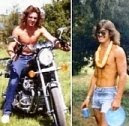 If the
photograph looks familiar, it is because I used it once before .... long/long ago
on June 23, 2015, with a post entitled, "My voice is as the wind amidst
ghosts." You get three guesses what I meant by those words. The "moon" is here again
because it is sort of tied in with the post today, as you will discover if you
continue reading. There also are four videos, two about "genteel" music and two
about "heavy-duty" rock, which also have roles to play in this performance:
If the
photograph looks familiar, it is because I used it once before .... long/long ago
on June 23, 2015, with a post entitled, "My voice is as the wind amidst
ghosts." You get three guesses what I meant by those words. The "moon" is here again
because it is sort of tied in with the post today, as you will discover if you
continue reading. There also are four videos, two about "genteel" music and two
about "heavy-duty" rock, which also have roles to play in this performance:Louis-Hector
Berlioz: "Requiem," Robert Shaw conducting a rehearsal / J.S. Bach: "Dona Nobis Pacem"
from Mass in b minor, BWV 232, Robert Shaw conducting / AC\DC: "You Shook Me
All Night Long," cover by Sershen & Zaritskaya, featuring Kim and Shturmak / (AC\DC: "You Shook Me All Night Long," cover by Sershen & Zaritskaya,
drunk drummer playthrough
Music is "very damn near a
religion"
Ever think about -- wonder about
-- the first time and the last time?
Whoa ....
This probably is not what
entered your mind as you read the opening sentence, but it is related in sort of a sideways manner.
Specifically, I was wondering about the first book you ever read and which might be the last you ever read .... or a song
-- what was the first song you ever heard that you recall and which will be the last you ever will hear?
Do things such as these make a difference? Are they at all relevant to your life?
Robert Lawson Shaw believed these
things are very important in terms of music and once said these words in respect to concert songs: "You
never know who is going to be hearing that piece for the first time, and you
never know who is going to be hearing that piece for the last time."
He believed that alone makes the piece and the performance very important -- relevant beyond words.
This was not Robert Archibald
Shaw, the English actor, novelist and playwright speaking, an individual I admire for
his performances on stage and film. That Shaw probably is best remembered as the
assassin in, "From Russia with Love," and the obsessed fisherman in, "Jaws."
Rather, this is Shaw, the "music
man." He probably is best remembered as the director of the Cleveland Orchestra
and Chorus and the Atlanta Symphony Orchestra and Chorus. He is also noted for being a "perfectionist"
with his performances and his recordings, and for his absolute support for racial integration in his
choruses. He died in 1999 from a stroke while attending a performance of Samuel
Beckett's one-act play, "Endgame," at Yale University.
Music was more than luxury or
entertainment for Shaw. It was communication, spirit itself, a moral force .... "very
damn near a religion." His rehearsal techniques, isolating rhythm, pitch or
enunciation, were calculated for maximum effect and efficiency. He might reseat
singers, mixing voices to achieve a homogeneous overall sound, or shift voices
to another line if it suited his concept of the way resonance was best
projected.
Shaw believed a song could
transform individuals many ways and change their lives, which was why he was a "perfectionist"
and sought synthesis between the practical and the emotional when preparing for
concerts. Once a choir became fully accountable for the structure of a piece,
the "true magic" of emotion and interpretation could emerge, he said.
Hmmmm ....
The other song features Daria Zaritskaya and Sergey Sershen from Kiev. Information about the band is scarce, but I assume all its members are from the same area, including the drunk drummer -- who sure can handle the sticks and skins and is one hell of a great chair dancer.
The contrast between the songs and the individuals performing them is ostensibly stark. From my perspective, it almost is a certainty it would be fascinating to individually interview a few from each group. It also almost is a certainty there are more similarities than one might expect.
The time for the "moon flight" has arrived: I have a habit for which there
is no real explanation. Each month, if and when I see the full moon, I look at
it long and hard wondering if this will be the last I ever see it. This month -- October
2020 -- we are fortunate. It is a "blue moon" month, with one full on the 1st
and another on the 31st.
I hope circumstances will be
right for me to see the one upcoming ....
So, one more reminder: Think a
bit in terms of the first and the last and, if nothing else, it will give you greater appreciation for the life you have ....
















